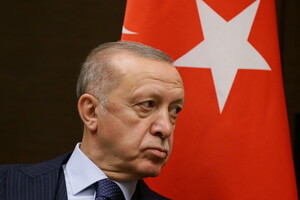Experts believe that Ankara has benefited greatly from its ambiguous position in the Russian-Ukrainian war, but it is also important for it that Kyiv maintains control over its coast.

From the very first day of the full-scale Russian invasion of Ukraine Turkey found itself in a “geopolitical vise”, carefully balancing relations with both sides.
For example, Turkish drones helped Kyiv stop the advance of the Kremlin's army. But Ankara's complicated relations and economic partnership with Moscow have also severely damaged Turkey's image in the West as a peacemaker in this conflict. The last unexpected turn was the visit of Turkish President Recep Tayyip Erdogan to Lviv, where he met with President Volodymyr Zelenskyi and UN Secretary General António Guterres. But two weeks ago, the Turkish leader met with Vladimir Putin in Sochi. And they promised each other to strengthen cooperation.
All this, according to the Atlantic Council, raises the question: how long will Erdogan play for both camps in this brutal conflict?
According to Rich Autzen, a researcher at the Turkish program of the Atlantic Council, Turkey's balancing act can be evaluated from three positions: whether it managed to help Ukraine avoid defeat, whether it managed to avoid a conflict with Russia while demonstrating solidarity with the West, and whether Ankara gained more diplomatic weight in your region According to the expert, Turkey performed quite well on all three vectors. Drone deliveries helped protect Kyiv from the Russian army. Erdogan has maintained trade and coordination with Russia in Syria. And the grain agreement demonstrated that Turkey has increased its influence.
Read also: Ukraine and Turkey signed a memorandum on post-war reconstruction
“The Russian war against Ukraine gave Turkey an opportunity to turn the vulnerability of its shaky position between Russia and Ukraine (and the West) into a diplomatic asset. Ankara has benefited from relations with both Kyiv and Moscow, first offering itself as a mediator and then using its constructive role in the conflict to gain “immunity” from the West to develop trade and economic relations with sanctioned Russian businesses, while supporting Ukraine in the military field”, – explained Evgenia Haber, an expert of the Turkish Atlantic Council program.
According to Autzen, the preservation of independent Ukraine is very important for Erdogan. Because if Russia absorbs it, it will be a serious threat to Turkey's security. But the Turkish economy also worries him. Also, before next year's elections, Erdogan wants to demonstrate that he is a great statesman. According to the expert, Turkey will continue to avoid choosing one side in the war.
“Ukrainian defeat and dismemberment will be a huge disaster for Turkey. But the defeat and potential instability of Russia will also negatively affect Turkish interests in Syria and the Caucasus, as well as the economy. Erdogan has a transactional but good relationship with Putin. Military and political support for Ukraine, but maintaining economic and political relations with Russia is an effective shield. Kyiv and Moscow remain dissatisfied. But there are no dynamics that would force Ankara to choose one side,” Autzen believes.
Haber believes that Ankara will try to maintain good relations with both Kyiv and Moscow, but “at different levels.” It will support Ukraine at the political, diplomatic and, to some extent, military level.
Read also: Erdogan will offer Zelensky a temporary ceasefire – mass media
To a certain extent, Turkey will also cooperate with NATO, while avoiding direct intervention by allies in the region (for example, not allowing NATO ships into the Black Sea). And in relations with Russia, the Turkish side will try to maintain close cooperation in energy, economy and tourism.
Related video
“The greatest benefit to Turkey will be the restoration of security and trade in the Black Sea region, while Ukraine retains as much of its territory as possible (and especially cities on the coast). Ankara has a long history of promoting its security interests among its neighbors without the rhetorical rituals that could escalate the conflict. We have seen this in relations, in particular, with Iran and Iraq,” noted Brenda Shaffer, a researcher at the Center for Global Energy.




